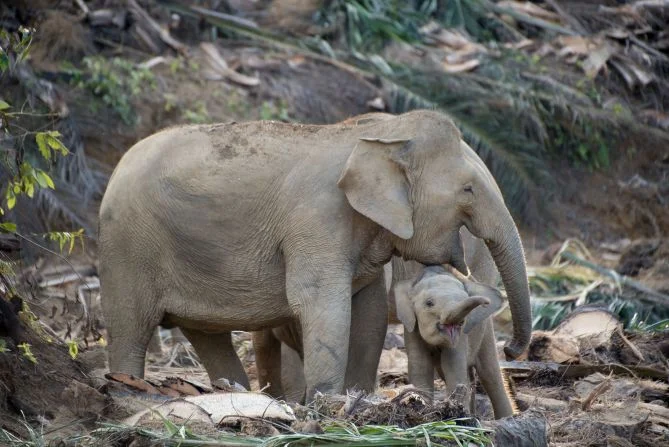
Saving The World’s Smallest Elephants: A Bold Conservation Effort
The world’s smallest elephants, the Bornean elephants, are on the brink of extinction. Measuring around nine feet tall, these gentle giants, native to the lush forests of Borneo, face unprecedented threats from habitat destruction. Conservation efforts, led by passionate individuals like Dr. Farina Othman, aim to change this dire situation and restore hope for these magnificent creatures.
With fewer than 1,000 Bornean elephants remaining, their survival is critically jeopardized by the rapid deforestation driven by logging and palm oil plantations. Over the past 40 years, 60% of their natural habitat has been lost, leading to fragmented populations and increasing encounters with humans. These conflicts have resulted in the tragic deaths of 131 elephants between 2010 and 2020 due to human-related causes, such as accidental poisoning.

Dr. Othman, a Malaysian elephant ecologist, founded her conservation organization, Seratu Aatai, in 2018 to address these challenges head-on. Her innovative approach involves creating wildlife corridors that allow elephants to navigate safely through agricultural landscapes. This ambitious plan not only aims to protect the elephants but also aims to educate plantation owners on the importance of biodiversity and sustainable practices.
In recognition of her efforts, Dr. Othman was recently awarded the prestigious 2025 Whitley Award, which will provide her with £50,000 ($66,000) to expand her vital work. "If only one plantation wants to do this, it won’t work. We need to create a consortium of several plantations so that we can connect this corridor back to the wildlife sanctuary,” she stated, highlighting the need for collective action in conservation.

Creating these corridors has not been without its challenges. Initially, many plantation owners were reluctant to engage in dialogue. However, Dr. Othman’s persistence has helped foster understanding about the necessity of preserving the ecosystem for the long-term benefit of both elephants and farmers. She emphasizes that protecting these elephants is an urgent responsibility and a shared goal.
Dr. Othman's belief in the emotional intelligence of elephants is profound. She recalled moments when elephants could have harmed her but instead showed restraint. "I believe that they can really read your heart and what is in your mind,” she shared, reflecting the deep connection she feels with these animals.
The plight of the Bornean elephants is a reminder of the fragility of our planet's biodiversity. As their existence hangs in the balance, the compassionate efforts of individuals like Dr. Othman serve as a beacon of hope. How can we, as a global community, support these vital conservation initiatives? Share your thoughts and let’s raise awareness around saving our planet’s precious wildlife.